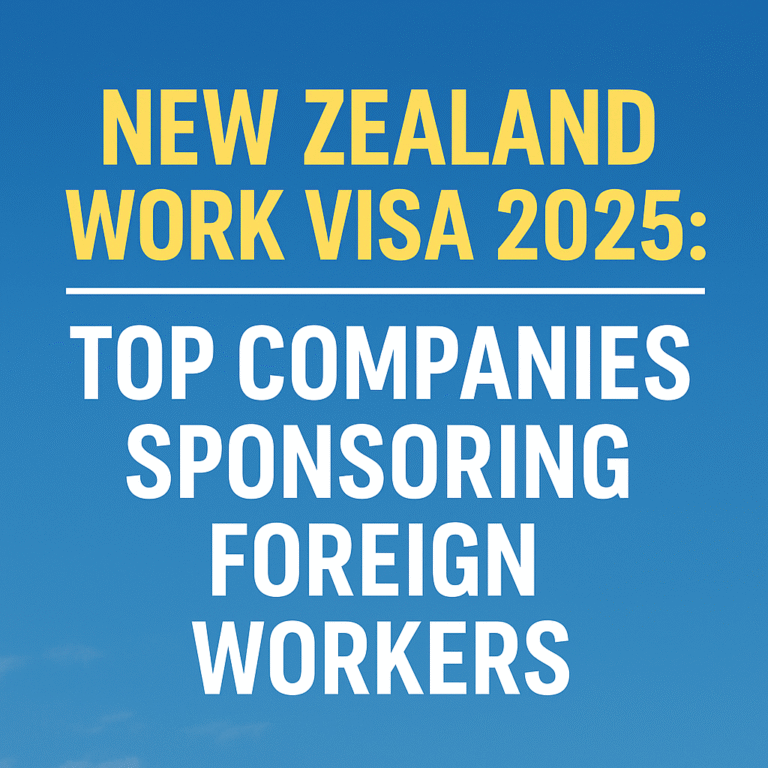UK Charity Worker Visa – Get Sponsored to Work with Non-Profits in 2025
The United Kingdom Charity Worker Visa which is a part of the Temporary Work visa category offers foreign nationals the chance to contribute to humanitarian, educational, religious, and community projects across the United Kingdom.
If you’re passionate about social impact and have a genuine desire to help others, this is one of the most accessible UK visa routes with sponsorship — even if you don’t hold an advanced degree or years of formal experience.
In 2025, UK-registered charities continue to rely on international talent to fill volunteer roles, outreach positions, and faith-based duties. This visa not only enables you to make a difference, but also provides an entry point into the UK job market, valuable work experience, and networking opportunities in the non-profit sector.
What Is the UK Charity Worker Visa?
The Charity Worker visa (Temporary Work) allows individuals to come to the UK and undertake unpaid voluntary work for a licensed UK charity for up to 12 months.
Unlike traditional job offers, this visa is designed for:
- Faith-based mission workers
- Humanitarian aid volunteers
- Community outreach participants
- Roles in education, support services, and advocacy
The sponsoring organisation must be a licensed charity sponsor approved by the Home Office. Importantly, this visa does not require you to be paid, but many sponsoring charities provide free accommodation, daily stipends, meals, and travel allowances.
Why Choose the Charity Worker Visa Route in 2025?
As the UK experiences rising demand for outreach and support services, especially due to the cost-of-living crisis and refugee resettlement efforts, non-profits are increasing international recruitment.
Benefits include:
- Visa sponsorship provided by UK charities
- No degree required
- Free housing and meals in many roles
- Flexibility to work across multiple UK locations
- Ideal for gaining UK experience and references
- Access to UK public services (in some cases)
- Opportunity to transition into longer-term roles or permanent routes
This visa is particularly popular among graduates, recent volunteers, faith workers, and those passionate about global missions.
Job Overview: What You’ll Be Doing
This visa is not for traditional employment. Instead, you’ll be volunteering in structured roles that support the charity’s mission. You’ll typically:
- Assist vulnerable communities (homeless, elderly, refugees)
- Participate in community outreach and advocacy
- Help organise food banks, donation drives, and events
- Provide language support, cultural orientation, or pastoral care
- Teach basic skills or provide non-certified training
- Offer administrative or logistical support to charity operations
Your duties will depend on the charity’s field — whether it’s education, faith-based outreach, healthcare support, environmental work, or refugee integration.
Roles & Responsibilities of Charity Workers
While roles vary depending on the organisation’s focus, common responsibilities include:
Faith-Based Missions
- Supporting religious services
- Assisting in youth or adult faith groups
- Offering spiritual support or translation services
Humanitarian Aid & Refugee Support
- Supporting housing/resettlement programs
- Distributing aid and essentials
- Providing community orientation for new arrivals
Education and Social Work
- Running youth programmes or workshops
- Assisting teachers in underprivileged communities
- Offering language support (e.g., English practice)
Logistics & Admin
- Assisting in charity shops
- Handling documentation or fundraising campaigns
- Supporting volunteer coordination or event management
Each task contributes to meaningful impact, while allowing you to develop cross-cultural work experience in one of the world’s most respected non-profit environments.
Eligibility Criteria for the Charity Worker Visa
You must meet the following criteria:
- Be 18 or older
- Have a Certificate of Sponsorship (CoS) from a UK-licensed charity
- Be doing genuine unpaid voluntary work that directly supports the charity’s cause
- Be financially self-sufficient or have your living expenses covered by the sponsor
- Meet tuberculosis (TB) test requirements if from a listed country
- Have no criminal history relevant to charity or support work
Visa Sponsorship and the Application Process
- Secure a Role with a Licensed Charity Sponsor
- Apply directly through the charity’s website or job boards
- You’ll need a formal offer and a Certificate of Sponsorship
- Gather Required Documents
- Valid passport
- Certificate of Sponsorship number
- TB test results (if applicable)
- Proof of savings (£1,270 for 28 days) unless fully supported by the charity
- Letter from sponsor detailing living arrangements and role
- Apply Online for the Temporary Work – Charity Worker Visa
- Pay the application fee (£298)
- Pay the Immigration Health Surcharge (£1035 for 12 months) to access the NHS
- Submit biometrics and attend a visa appointment
- Visa Processing Time
- Most applications are processed within 3 weeks if outside the UK
Financial Considerations and Benefits
Though the role is unpaid, you won’t be on your own. Most sponsoring charities provide:
- Free accommodation (shared housing or host family)
- Daily meals or food allowance
- Local travel stipends
- Full guidance on UK adjustment and culture
These benefits help you save money, live comfortably, and focus on your mission.
Duration and Conditions of Stay
- Maximum stay: 12 months
- You cannot extend this visa beyond one year
- You cannot switch to another visa category inside the UK
- You must leave the UK at the end of your assignment
However, after your volunteer experience, you may return to the UK under other routes such as:
- Skilled Worker Visa
- Graduate Visa
- Youth Mobility Scheme (for eligible countries)
Top UK Charities Offering Visa Sponsorship
Here are some well-known charities that have sponsored foreign volunteers in the past:
The Salvation Army
- Faith-based outreach to homeless, addicted, and displaced individuals
The British Red Cross
- Emergency aid, refugee services, disaster response, and education
Christian Action & Relief for All (CARA)
- Religious and community development projects
Refugee Action
- Resettlement programs and integration support
Oxfam GB (partner organisations)
- Local community shops and administrative charity work
Visit their websites to find open volunteer placements and reach out regarding their sponsorship policy.
How to Apply for Charity Worker Opportunities
Step 1: Research and Apply
- Visit gov.uk for a list of registered UK charity sponsors
- Use platforms like:
- CharityJob.co.uk
- Do-it.org
- Reach Volunteering
- ChristianJobs.co.uk
Step 2: Interview and Role Matching
- Be prepared to explain your motivation and previous volunteer or community work
- Be honest about availability and your visa timeline
Step 3: Receive Certificate of Sponsorship (CoS)
- The charity will issue this digitally, and you’ll include the reference in your visa application
Frequently Asked Questions (FAQs)
Is the charity worker visa paid?
No, this visa is for unpaid volunteer work, but most charities offer accommodation, meals, and basic expenses.
Can I bring my spouse or children?
No. The Charity Worker Visa does not allow dependants to accompany you.
Can I apply for another UK visa after this one?
Yes, but you must leave the UK and apply afresh from your home country under a different visa route.
Do I need a degree to qualify?
No degree is required, charities care more about your willingness to serve, work ethic, and cultural sensitivity.
How long does it take to process?
On average, 3 weeks if applying from outside the UK.
Conclusion
If you’re looking for a purpose-driven experience, the UK Charity Worker Visa offers a life-changing opportunity to contribute to global good while gaining exposure to one of the most respected non-profit ecosystems in the world.
You’ll gain real-world skills, deepen your commitment to service, and forge meaningful international connections — all while being supported with visa sponsorship, accommodation, and guidance.




